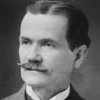BEARD, n. The hair that is commonly cut off by those who justly execrate the absurd Chinese custom of shaving the head.
Ambrose Bierce (1842-1914?) American writer and journalist
“Beard,” The Cynic’s Word Book (1906)
(Source)
Included in The Devil's Dictionary (1911). Originally published in the "Devil's Dictionary" column in the San Francisco Wasp (1881-04-30).
I always fear less a dull man who is naturally strong
Than someone who is weak and clever.
[ἀεὶ γὰρ ἄνδρα σκαιὸν ἰσχυρὸν φύσει
ἧσσον δέδοικα τἀσθενοῦς τε καὶ σοφοῦ.]Euripides (485?-406? BC) Greek tragic dramatist
Bellerophon [Βελλεροφῶν], frag. 290 (TGF) (c. 430 BC) [tr. @sentantiq (2015)]
(Source)
Barnes frag. 51, Musgrave frag. 11. (Source (Greek)). Alternate translations:
By far less dangerous I esteem the fool
Endued with strength of body, than the man
Who's feeble and yet wise.
[tr. Wodhull (1809)]
I always fear a stupid if bodily powerful man less than one who is both weak and clever.
[tr. Collard, Hargreaves, Cropp (1995)]
Always I fear an unintelligent but naturally strong man less than a weak and clever one.
[tr. Stevens (2012)]
I fear less the powerful but stupid
than the weak and cunning.
[Source]
Whence had you this illustrious name?
From virtue and unblemish’d fame.
By birth the name alone descends;
Your honour on yourself depends:
Think not your coronet can hide
Assuming ignorance and pride.
Learning by study must be won,
‘Twas ne’er entail’d from son to son.John Gay (1685-1732) English poet and playwright
“The Pack-Horse and Carrier (To a young Nobleman),” ll. 41-42
(Source)
Some printings of the poem leave off the prologue, of which this is a part.
But, indeed, the dictum that truth always triumphs over persecution, is one of those pleasant falsehoods which men repeat after one another till they pass into commonplaces, but which all experience refutes. History teems with instances of truth put down by persecution. If not suppressed forever, it may be thrown back for centuries.
One must work, if not out of inclination, at least out of despair. All things considered, work is far less boring than entertaining oneself.
[Il faut travailler, sinon par goût, au moins par désespoir, puisque, tout bien vérifié, travailler est moins ennuyeux que s’amuser.]Charles Baudelaire (1821-1867) French poet, essayist, art critic
Journaux Intimes [Intimate Journals], “Mon cœur mis à nu [My Heart Laid Bare],” § 40 (1864–1867; pub. 1887) [tr. Sieburth (2022)]
(Source)
(Source (French)). Alternate translations:
One must work, if not from inclination at least from despair, since, as I have fully proved, to work is less wearisome than to amuse oneself.
[tr. Isherwood (1930)]
It is necessary to work, if not from inclination, at least from despair. As it turns out, work is less boring than amusing oneself.
[Source, e.g.]
One must work, if not from inclination, at least out of despair -- since it proves, on close examination, that work is less boring than amusing oneself.
[Source, e.g.]
GLOUCESTER: As flies to wanton boys are we to th’ gods;
They kill us for their sport.William Shakespeare (1564-1616) English dramatist and poet
King Lear, Act 4, sc. 1, l. 41ff (4.1.41-42) (1606)
(Source)
Study the historian before you begin to study the facts. This is, after all, not very abstruse. It is what is already done by the intelligent undergraduate who, when recommended to read a work by that great scholar Jones of St. Jude’s, goes round to a friend at St. Jude’s to ask what sort of chap Jones is, and what bees he has in his bonnet. When you read a work of history, always listen out for the buzzing. If you can detect none, either you are tone deaf or your historian is a dull dog. The facts are really not at all like fish on the fishmonger’s slab. They are like fish swimming about in a vast and sometimes inaccessible ocean; and what the historian catches will depend partly on chance, but mainly on what part of the ocean he chooses to fish in and what tackle he chooses to use – these two factors being, of course, determined by the kind of fish he wants to catch. By and large, the historian will get the kind of facts he wants. History means interpretation.
E. H. Carr (1892-1982) British historian, journalist, international relations theorist [Edward Hallett "Ted" Carr]
What Is History?, ch. 1 (1961)
(Source)
Sometimes when a person sees the roguery of poor people and the thievery of people in high positions, he is tempted to regard society as a forest full of robbers, the most dangerous of which are the policemen that are set up to stop the others.
[En voyant quelquefois les friponneries des petits et les brigandages des hommes en place, on est tenté de regarder la société comme un bois rempli de voleurs, dont les plus dangereux sont les archers, préposés pour arrêter les autres.]
Nicolas Chamfort (1741-1794) French writer, epigrammist (b. Nicolas-Sébastien Roch)
Products of Perfected Civilization [Produits de la Civilisation Perfectionée], Part 1 “Maxims and Thoughts [Maximes et Pensées],” ch. 3, ¶ 198 (1795) [tr. Siniscalchi (1994)]
(Source)
(Source (French)). Alternate translations:
Seeing the rogueries of little men and the extortions of the great in office, one is tempted to look upon Society as a wood infested by robbers, the most dangerous being the constables sent to arrest the others.
[tr. Mathers (1926)]
At times, seeing the petty thieveries of the petty, and the robberies of those in office, one is tempted to regard society as a wood full of thieves, of which the most dangerous are the officers set there to arrest the others.
[tr. Merwin (1969)]
Sometimes, when one observes the rogueries perpetuated by petty people and the graft committed by men in office, one is tempted to think of society as a wood infested by thieves, of which the most dangerous are the archers, posted to prevent the others from escaping.
[tr. Pearson (1973)]
There are times when, seeing the nasty tricks people get up to, the gross frauds of high officers, you're tempted to think that you're in a wood infested by thieves, amongst whom the most dangerous are the police, whose purpose is supposed to be that of arresting them.
[tr. Parmée (2003), ¶ 152]
When writers die they become books, which is, after all, not too bad an incarnation.
The root of human virtue seldom bears
Like branches; and the Giver wills it so,
That men may know it is His gift, not theirs.
[Rade volte risurge per li rami
l’umana probitate; e questo vole
quei che la dà, perché da lui si chiami.]Dante Alighieri (1265-1321) Italian poet
The Divine Comedy [Divina Commedia], Book 2 “Purgatorio,” Canto 7, l. 121ff (7.121-123) (1314) [tr. Sayers (1955)]
(Source)
Dante noting that the sons of great kings rarely measure up to their fathers, a reminder from God that those who would be great must seek His blessing, not rely on their heritage.
(Source (Italian)). Alternate translations:
Rarely into the branches of the tree
Doth human worth mount up; and so ordains
He who bestows it, that as his free gift
It may be call’d.
[tr. Cary (1814)]
Rarely shoots merit up into the boughs,
Or human worth; and such the will of Him,
That from the Donor they should seem to come.
[tr. Bannerman (1850)]
Not oftentimes upriseth through the branches
The probity of man; and this He wills
Who gives it, so that we may ask of Him.
[tr. Longfellow (1867)]
Seldom rises human goodness through the branches; and this wills He who gives it in order that from Him it may be claimed.
[tr. Butler (1885)]
But rarely in the branch again is grown
Our human excellence, so willeth He
Who gives it, that the boon be called His own.
[tr. Minchin (1885)]
Rarely doth human goodness rise through the branches, and this He wills who gives it, in order that it may be asked from Him.
[tr. Norton (1892)]
Rarely doth human probity rise through the sons branches:
and this he wills who giveth it,
so that it may be prayed for from him.
[tr. Okey (1901)]
Rarely does human worth rise through the branches, and this He wills who gives it, that it may be sought from Him.
[tr. Sinclair (1939)]
Full seldom human virtue rises through
The branches; and the Giver wills it so,
That they to him for such a gift may sue.
[tr. Binyon (1943)]
Rare is the tree that lifts to every limb
the sap of merit -- He who gives, so wills
that men may learn to beg their best from Him.
[tr. Ciardi (1961)]
Rarely does human worth rise through the branches, and this He wills who gives it, in order that it may be asked from Him.
[tr. Singleton (1973)]
Not often does the sap of virtue rise
to all the branches. This is His own gift,
and we can only beg that He bestow it.
[tr. Musa (1981)]
Rarely does human worth rise through the branches;
That is the will of him whose gift it is,
So that it should be matter for petition.
[tr. Sisson (1981)]
How seldom human worth ascends from branch to branch,
and this is willed by Him who grants that gift,
that one may pray to Him for it!
[tr. Mandelbaum (1982)]
Seldom does human probity rise up through the branches, and this is willed by him who gives it, that it may be attributed to him.
[tr. Durling (2003)]
Human worth rarely increases through its branches: and this He wills who creates it, so that it may be asked for of him.
[tr. Kline (2002)]
It seldom happens that man’s probity
will rise through every branch. He wills it thus,
so, given from beyond, it’s known as His.
[tr. Kirkpatrick (2007)]
Rarely does human worth rise through the branches.
And this He wills who gives it,
so that it shall be sought from Him.
[tr. Hollander/Hollander (2007)]
Goodness rarely flows to the spreading branches
Of a family tree, for God who gives it decrees
That since the gift is His, humans must ask it.
[tr. Raffel (2010)]
The rule is, we are to Give as we would Receive, cheerfully, quickly, and without Hesitation; for there’s no Grace in a Benefit that sticks to the fingers.
Seneca the Younger (c. 4 BC-AD 65) Roman statesman, philosopher, playwright [Lucius Annaeus Seneca]
Morals, Part 1 “Of Benefits,” ch. 7 “The Manner of Obliging” [tr. L’Estrange (1693)]
(Source)
The awareness of the ambiguity of one’s highest achievements (as well as one’s deepest failures) is a definite symptom of maturity.
Paul Tillich (1886-1965) American theologian and philosopher
Quoted in Time (1963-05-17)
(Source)
Speech given at the 40th Anniversary Dinner for Time, reported in the following week's magazine.
It is the certainty that they possess the truth that makes men cruel.
[C’est la certitude qu’ils tiennent la vérité qui rend les hommes cruels.]
Anatole France (1844-1924) French poet, journalist, novelist, Nobel Laureate [pseud. of Jaques-Anatole-François Thibault]
(Misquotation)
Widely attributed (in French and English) to Anatole France, but not found in his works, including the one location it is sometimes cited from, Les Dieux Ont Soif [The Gods Are Thirsty, The Gods Are Athirst, The Gods Will Have Blood] (1912), in either English translation or, more importantly, in the original French.
While thematically keeping in the novel's depiction of the French Revolution and the Terror, the closest match to the quote I can find is this portion of ch. 22, talking about the expediting of the trials of those charged with counter-revolutionary crimes, eliminating the need to prove a misdeed by simply inquiring as to the accused's beliefs.
Justice thus abbreviated satisfied them; the pace was quickened, and no obstacles were left to fret them. They limited themselves to an inquiry into the opinions of the accused, not conceiving it possible that anyone could think differently from themselves except in pure perversity. Believing themselves the exclusive possessors of truth, wisdom, the quintessence of good, they attributed to their opponents noting but error and evil. They felt themselves all-powerful; they envisaged God.
[tr. Allinson (1913), Jackson (1921)]
Justice, thus curtailed, satisfied them; the pace was quickened and no obstacles were left to confuse them. They confined themselves to inquiring into the opinions of the accused, not conceiving it possible that anyone, except from pure perversity, could think differently from themselves. Believing themselves to possess a monopoly of truth, wisdom and goodness, they attributed to their opponents all error, stupidity and evil. They felt themselves omnipotent: their eyes had seen God.
[tr. Davies (1979)]
La justice abrégée les contentait. Rien, dans sa marche accélérée, ne les troublait plus. Ils s’enquéraient seulement des opinions des accusés, ne concevant pas qu’on pût sans méchanceté penser autrement qu’eux. Comme ils croyaient posséder la vérité, la sagesse, le souverain bien, ils attribuaient à leurs adversaires l’erreur et le mal. Ils se sentaient forts : ils voyaient Dieu.
[Original]
We are of each an unsocial, taciturn disposition, unwilling to speak, unless we expect to say something that will amaze the whole room, and be handed down to posterity with all of the eclat of a proverb.
No form of liberty is worth a darn which doesn’t give us the right to do wrong now and then.
H. L. Mencken (1880-1956) American writer and journalist [Henry Lewis Mencken]
A Little Book in C Major, ch. 3, § 16 (1916)
(Source)
A neurotic is someone who’s afraid to see himself as he’s afraid others see him.
Mignon McLaughlin (1913-1983) American journalist and author
The Second Neurotic’s Notebook, ch. 10 (1966)
(Source)
Thy Godlike crime was to be kind,
To render with thy precepts less
The sum of human wretchedness,
And strengthen Man with his own mind.
Remember, today is the tomorrow you worried about yesterday.
Dale Carnegie (1888-1955) American writer, lecturer
How to Stop Worrying and Start Living, Part 10 “How I Conquered Worry” (1948)
(Source)
Final note by Carnegie on the story "Six Major troubles Hit Me All At Once" by C. I. Blackwood of Oklahoma City.
The phrase was a "rule" Carnegie taught in his adult courses, and he collected many reports from students about how the various rules taught in the course actually worked in their lives. Thus the "remember" above and how the phrase is also mentioned, quoted in the past tense, in the story "I Now Look for the Green Light," by Joseph M. Cotter of Chicago: "I was told over and over that 'today was the tomorrow I had worried about yesterday.'"
We cannot all do everything.
[Non omnia possumus omnes.]Virgil (70-19 BC) Roman poet [b. Publius Vergilius Maro; also Vergil]
Eclogues [Eclogae, Bucolics, Pastorals], No. 8 “Pharmaceutria,” l. 63 (8.63) (42-38 BC) [tr. Mackail (1899)]
(Source)
Invoking the Pierian Muses to finish the tale, after the singer has given the first half.
(Source (Latin)). Alternate translations:
All cannot all things do.
[tr. Ogilby (1649)]
We cannot all do all things.
[tr. Davidson (1854), Wilkins (1873), Greenough (1895), Day Lewis (1963), @sentantiq (2018)]
Scarce may all do everything.
[tr. Calverley (c. 1871)]
We are not equal all
To every theme.
[tr. Palmer (1883)]
All things are not possible to all.
[tr. Bryce (1897)]
We cannot all do everything.
[tr. Fairclough (Loeb) (1916)]
We are not all sufficient for all things.
[tr. Mackail/Cardew (1908)]
No single singer touches all the chords.
[tr. Williams (1915)]
We cannot all succeed in every task.
[tr. Rieu (1949)]
For none of us all is skilful in all things.
[tr. Johnson (1960)]
We are not all capable of all things.
[tr. Kline (2001)]
I will apologise for many things that I have done, but I will not apologise for the things that should never be apologised for. It is a little theory of mine that has much exercised my mind lately, that most of the problems of this silly and delightful world derive from our apologising for those things which we ought not to apologise for, and failing to apologise for those things for which apology is necessary.
Stephen Fry (b. 1957) British actor, writer, comedian
Moab Is My Washpot, “Falling In,” ch. 3 (1997)
(Source)
One of the things that militates against happiness is worry, and that’s one respect in which I’ve become much happier as I’ve grown older. I worry much less and I found a very useful plan in regard to worry, which is to think, “Now what is the very worst thing that could happen?” And then think, “Well, after all it wouldn’t be so very bad a hundred years hence; it probably won`t matter.” After you’ve really made yourself think that, you won`t worry so much. Worry comes from not facing unpleasant possibilities.
Bertrand Russell (1872-1970) English mathematician and philosopher
Interview by Woodrow Wyatt, BBC TV (1959)
Collected in Bertrand Russell's BBC Interviews (1959) [UK] and Bertrand Russell Speaks His Mind (1960) [US]. Reprinted (abridged) in The Humanist (1982-11/12), and in Russell Society News, #37 (1983-02).
We must not forget that when radium was discovered no one knew that it would prove useful in hospitals. The work was one of pure science. And this is a proof that scientific work must not be considered from the point of view of the direct usefulness of it. It must be done for itself, for the beauty of science, and then there is always the chance that a scientific discovery may become like the radium a benefit for humanity.
Marie Curie (1867-1934) Polish-French physicist and chemist [b. Maria Salomea Skłodowska]
“The Discovery of Radium,” lecture, Vassar College (1921-05-14)
(Source)
Whoever said money can’t solve your problems must not have had enough money to solve them.
Ariana Grande (b. 1993) American singer, songwriter, actress
“7 Rings”, Thank U, Next (2018)
(Source)
A wise woman once said to me that there are only two lasting bequests we can hope to give our children. One of these she said is roots, the other, wings.
Hodding Carter II (1907-1972) American journalist and author [William Hodding Carter II]
Where Main Street Meets the River, “It’s How We Like It” (1953)
(Source)
Almost always quoted without the notes about the "wise woman," e.g.,
There are only two lasting bequests we can hope to give our children: one of these is roots, the other, wings.
Can’t you understand that if you take a law like evolution and make it a crime to teach it in public schools, tomorrow you could make it a crime to teach it in private schools, and tomorrow you may make it a crime to read about it? And soon you may ban books and newspapers. And then you may turn Catholic against Protestant, and Protestant against Protestant, and try to foist your own religion upon the mind of man. If you can do one you can do the other, because fanaticism and ignorance is forever busy and needs feeding.
Nedrick Young (1914-1968) American screenwriter and actor [pseud. Nathan E. Douglas]
Inherit the Wind, film (1960) [with Harold Jacob Smith]
(Source)
The original 1951 play was written by Jerome Lawrence and Robert E. Lee, but does not include this line, delivered in the film by Spencer Tracy. Young and Smith share the screenwriting credits.
BACCHUS, n. A convenient deity invented by the ancients as an excuse for getting drunk.
Ambrose Bierce (1842-1914?) American writer and journalist
“Bacchus,” The Cynic’s Word Book (1906)
(Source)
Included in The Devil's Dictionary (1911). Originally published in the "Devil's Dictionary" column in the San Francisco Wasp (1881-04-23).
Call me a scoundrel, only call me rich!
All ask how great my riches are, but none
Whether my soul is good.[ἔα με κερδαίνοντα κεκλῆσθαι κακόν]
Euripides (485?-406? BC) Greek tragic dramatist
Bellerophon [Βελλεροφῶν], frag. 181 (Nauck, TGF) (c. 430 BC) [tr. Gummere (1925)]
(Source)
Barnes frag. 65. Found (in Latin) in Seneca, Epistulae morales ad Lucilium, 115.14:
Sine me vocari pessimum, ut dives vocer.
An dives, omnes quaerimus, nemo, an bonus.
(Source (Greek)). Alternate translations:
If any gain ensue, I am content.
To be term'd wicked. We all ask this question,
Whether a man be rich, not whether virtuous.
[tr. Wodhull (1809)]
Let me be called a scoundrel, but a rich one.
We all ask if he’s rich, not if he’s good.
[Source]
Learning without thought ends in a blur. Thought without learning will soon totter.
[學而不思則罔、思而不學則殆。]Confucius (c. 551- c. 479 BC) Chinese philosopher, sage, politician [孔夫子 (Kǒng Fūzǐ, K'ung Fu-tzu, K'ung Fu Tse), 孔子 (Kǒngzǐ, Chungni), 孔丘 (Kǒng Qiū, K'ung Ch'iu)]
The Analects [論語, 论语, Lúnyǔ], Book 2, verse 15 (2.15) (6th C. BC – AD 3rd C.) [tr. Ware (1950)]
(Source)
Many (but not all) translators suggest that learning/study here is not general academics, but examining and maintaining the ancient traditions.
(Source (Chinese)). Alternate translations:
Learning without thought is labour lost; thought without learning is perilous.
[tr. Legge (1861)]
Learning with [sic] thought is a snare; thought without learning is a danger.
[tr. Jennings (1895)]
Study without thinking is labour lost. Thinking without study is perilous.
[tr. Ku Hung-Ming (1898)]
Learning without thought is useless. Thought without learning is dangerous.
[tr. Soothill (1910)]
Education without meditation is useless. Meditation without education is risky.
[tr. Soothill (1910), alternate]
Research without thought is a mere net and entanglement: thought without gathering data, a peril.
[tr. Pound (1933)]
He who learns but does not think, is lost. He who thinks but does not learn is in great danger.
[tr. Waley (1938)]
If one learns from others but does not think, one will be bewildered. If, on the other hand, one thinks but does not learn from others, one will be in peril.
[tr. Lau (1979)]
If one studies but does not think, one is caught in a trap. If one thinks but does not study, one is in peril.
[tr. Dawson (1993)]
To study without thinking is futile. To think without studying is dangerous.
[tr. Leys (1997)]
Learning without thinking is fruitless; thinking without learning is perplexing.
[tr. Huang (1997); additional translations.]
Studying but not thinking, it is confused; Thinking but not studying, it is dangerous.
[tr. Cai/Yu (1998)]
Learning without due reflection leads to perplexity; reflection without learning leads to perilous circumstances.
[tr. Ames/Rosemont (1998)]
If he studies and does not reflect, he will be rigid. If he reflects but does not study, he will be shaky.
[tr. Brooks/Brooks (1998)]
To learn and never think -- that's delusion. But to think and never learn -- that is perilous indeed!
[tr. Hinton (1998)]
If you learn without thinking about what you have learned, you will be lost. If you think without learning, however, you will fall into danger.
[tr. Slingerland (2003)]
Learning without thought is pointless. Thought without learning is dangerous.
[tr. Watson (2007)]
If you learn but do not think, you will be dazed. If you think but do not learn, you will be in danger.
[tr. Chin (2014)]
Learning from books without critical thinking results in confusion. Thinking vacuously without learning from books is perilous.
[tr. Li (2020)]
When the whole world is running towards a cliff, he who is running in the opposite direction appears to have lost his mind.
Language doesn’t belong to grammarians, linguists, wordsmiths, writers, or editors. It belongs to the people who use it. It goes where people want it to go, and, like a balky mule, you can’t make it go where it doesn’t want to go.
Rosalie Maggio (1944-2021) American writer
Talking About People: A Guide to Fair and Accurate Language, “Writing Guidelines” (1997)
(Source)
In this country it is useful from time to time to kill one admiral in order to encourage the others.
[Dans ce pays-ci il est bon de tuer de tems en tems un Amiral pour encourager les autres.]
Voltaire (1694-1778) French writer [pseud. of Francois-Marie Arouet]
Candide, ch. 23 (1759) [tr. Adams (1966)]
(Source)
As Candide witnesses the (real-life) 1757 execution of English Admiral John Byng, who withdrew his undermanned ships from a naval battle during the French invasion of Minorca at the beginning of the Seven Years War. Byng was scapegoated for poor condition of the Mediterranean fleet, and court martialed for "failing to do his utmost" in the battle, which carried an automatic death penalty. In real life, Voltaire had been one of the people who attempted to intervene on Byng's behalf. In the book, Candide is so appalled by the injustice, he refuses to touch ground on English soil.
The last few words ("pour encourager les autres") are frequently quoted on their own referring to any harsh punishment used as an example to incent those who follow.
(Source (French)). Alternate translations:
In this country it is found requisite, now and then, to put an admiral to death, in order to encourage the others to fight.
[tr. Smollett (1759)]
In this country it is found good, from time to time, to kill one Admiral to encourage the others.
[Source (1859)]
In this country it is found requisite, now and then, to put one admiral to death, in order to spirit up the others.
[tr. Smollett/Thornton (1920)]
In this country it is good to kill an Admiral from time to time to encourage the others.
[Modern Library ed. (1920)]
In this country it is necessary, now and then, to put one admiral to death in order to inspire the others to fight.
[tr. Morley (1922)]
In this country it is a good thing to kill an admiral from time to time to encourage the others.
[Random House ed. (1928)]
In this country it’s good to kill an admiral now and then, to encourage the others.
[tr. Bair (1959)]
In this country it is found requisite,now and then to kill an admiral, in order to encourage the others.
[tr. Cameron (1997)]
In this country they think it's good to kill an Admiral from time to time, to encourage the others.
[tr. Gordon (1999)]
On the necessary points, unity. On the questionable points, liberty. In everything, love.
Augustine of Hippo (354-430) Christian church father, philosopher, saint [b. Aurelius Augustinus]
(Misattributed)
A commentary on theological / doctrinal dispute, frequently attributed to Augustine, but not found in his works.
The first known occurrence of such an expression is in Marco Antonio de Dominis, De Republica Ecclesiastica, Book 4, ch. 8, penultimate sentence (1617):
Omnesque mutuam amplecteremur unitatem in necessariis, in non necessariis libertatem, in omnibus caritatem.
[And let us all embrace one another, unity in what is necessary, liberty in what is not necessary, charity in all things.]
The phrase was also adapted by Richard Baxter (1615-1691) as his motto. See also Rupertus Meldenius (1626).
More discussion about this quotation here: Liber locorum communium: In necessariis unitas, in non necessariis libertas, in utrisque caritas (Marco Antonio De Dominis, 1617), cf. In necessariis unitas, in dubiis libertas, in omnibus caritas (and other variants). English: "In essentials unity ..."
The least vile of all merchants is he who says: “Let us be virtuous, since, thus, we shall gain much more money than the fools who are dishonest.” For the merchant, even honesty is a financial speculation.
[Le moins infâme de tous les commerçants, c’est celui qui dit: Soyons vertueux pour gagner beaucoup plus d’argent que les sots qui sont vicieux. — Pour le commerçant, l’honnêteté elle-même est une spéculation de lucre.]
Charles Baudelaire (1821-1867) French poet, essayist, art critic
Journaux Intimes [Intimate Journals], “Mon cœur mis à nu [My Heart Laid Bare],” § 47 (1864–1867; pub. 1887) [tr. Isherwood (1930)]
(Source)
(Source (French)). Alternate translation:
The least despicable of merchants is the one who says: Let us be virtuous so that we can make far more money than those vice-ridden fools. -- For the merchant, even honesty offers a money-making opportunity.
[tr. Sieburth (2022)]
Change is certain. Progress is not.
E. H. Carr (1892-1982) British historian, journalist, international relations theorist [Edward Hallett "Ted" Carr]
(Attributed)
This is widely cited to his collection, From Napoleon to Stalin and Other Essays (1980), but I cannot find it there.
Love, such as it exists in high society, is merely an exchange of whims and the contact of skins.
[L’amour, tel qu’il existe dans la société, n’est que l’échange de deux fantaisies et le contact de deux épidermes.]
Nicolas Chamfort (1741-1794) French writer, epigrammist (b. Nicolas-Sébastien Roch)
Products of Perfected Civilization [Produits de la Civilisation Perfectionée], Part 1 “Maxims and Thoughts [Maximes et Pensées],” ch. 6, ¶ 359 (1795) [tr. Dusinberre (1992)]
(Source)
(Source (French)). Alternate translations:
Love as it exists in society is nothing more than the exchange of two fancies and the contact of two epidermes.
[tr. Hutchinson (1902)]
Love, as it s practiced in Society, is nothing but the exchange of two caprices and the contact of two skins.
[tr. Mathers (1926)]
Love as it exists in society is merely the mingling of two fantasies and the contact of two skins.
[tr. Merwin (1969)]
Love as it exists in society is only the exchange of two fantasies and the contact of two epidermises.
[tr. Sinicalchi]
A good heavy book holds you down. It’s an anchor that keeps you from getting up and having another gin and tonic. Many a person has been saved from summer alcoholism, not to mention hypertoxicity, by Dostoyevsky.
Roy Blount, Jr. (b. 1941) American writer, speaker, journalist, humorist
“Reading and Nothingness: Of Proust in the Summer Sun,” New York Times (1985-06-02)
(Source)
That the world can be improved and yet must be celebrated as it is are contradictions. The beginning of maturity may be the recognition that both are true.
William M. Stott (b. 1940) American diplomat, academic in American Studies and English, author
Documentary Expression and Thirties America, ch. 15 (1973)
(Source)
Closing words of the book.
For always the man in whom thought springs up over thought sets his mark farther off, for the one thought saps the force of the other.
[Ché sempre l’omo in cui pensier rampolla
sovra pensier, da sé dilunga il segno,
perché la foga l’un de l’altro insolla]Dante Alighieri (1265-1321) Italian poet
The Divine Comedy [Divina Commedia], Book 2 “Purgatorio,” Canto 5, l. 16ff (5.16-18) (1314) [tr. Sinclair (1939)]
(Source)
Virgil telling Dante he's overthinking things, letting himself be distracted.
(Source (Italian)). Alternate translations:
He, that permits his Fancy thus to stray.
With every lure, will rarely find his way
To that great end, to which his soul is bent:
For gath'ring fancies warp the steady light
Of Reason's beam, and leave her whelm'd in night,
For ever baffled of her first intent.
[tr. Boyd (1802), st. 3]
He, in whose bosom thought on thought shoots out,
Still of his aim is wide, in that the one
Sicklies and wastes to nought the other’s strength.
[tr. Cary (1814)]
He in whose bosom thought springs up to thought,
Destroys himself the figures of his loom --
The birth of one prepares the others's tomb.
[tr. Bannerman (1850)]
For evermore the man in whom is springing
Thought upon thought, removes from him the mark,
Because the force of one the other weakens.
[tr. Longfellow (1867)]
For ever the man, in whom thought wells up over thought, removes far from himself his mark, because the rush of the second slackens the first.
[tr. Butler (1885)]
Always the man in whom new thought doth grow
On previous thought, from his true course doth roam,
Because the one doth flag the other's glow.
[tr. Minchin (1885)]
For always the man in whom thought on thought wells up removes from himself his aim, for the force of one weakens the other.
[tr. Norton (1892)]
For ever the man in whom thought wells up on thought, sets back his mark, because the one saps the force of the other.
[tr. Okey (1901)]
For always he in whom thought overtakes
The former thought, his goal less clearly sees.
Because the one the other must relax.
[tr. Binyon (1943)]
He aims beside the mark whose fancies bubble
One on another, driving back and drumming
Each other out, so that his eye sees double.
[tr. Sayers (1955)]
For when a man lets his attention range
toward every wisp, he loses true direction,
sapping his mind's force with continual change.
[tr. Ciardi (1961)]
For always the man in whom thought wells
up on thought sets back his mark,
for one thought weakens the force of the other.
[tr. Singleton (1973)]
The man who lets his thoughts be turned aside
by one thing or another, will lose sight
of his true goal, his mind sapped of its strength.
[tr. Musa (1981)]
Because the man in whom thoughts bubble up
One after the other, goes wide of the mark,
Because one thought weakens the force of another.
[tr. Sisson (1981)]
The man in whom thought thrusts ahead of thought
allows the goal he’s set to move far off --
the force of one thought saps the other’s force.
[tr. Mandelbaum (1982)]
For always the man in whom one care sprouts above the other makes his target more distant, because the impulse of the one weakens the other.
[tr. Durling (2003)]
Since the man, in whom thought rises on thought, sets himself back, because the force of the one weakens the other.
[tr. Kline (2002)]
When thought is bred too rampantly from thought,
then, of himself, a man will miss the mark.
Each mental thrust debilitates the first.
[tr. Kirkpatrick (2007)]
For any man who lets one thought --
and then another -- take him over
will soon lose track of his first goal.
[tr. Hollander/Hollander (2007)]
A man whose mind is distracted lets thought after thought
Keep him from getting where he wants to go:
They hammer each other down; nothing can grow.
[tr. Raffel (2010)]
Where the heart is in the giving, there is no question of goods that are being traded thriftily. In giving, you throw a bridge across the chasm of your solitude.
Antoine de Saint-Exupéry (1900-1944) French writer, aviator
Citadelle [The Wisdom of the Sands], ch. 46 (1948) [tr. Gilbert (1950)]
(Source)
Care to our coffin adds a nail, no doubt;
And every grin, so merry, draws one out.John Wolcot (1738-1819) English satirist (pseud. Peter Pindar)
Expostulatory Odes to a Great Duke and a Little Lord, Ode 15, ll. 5-6 (1789)
(Source)
Among the lessons taught by the French Revolution, there is none sadder or more striking than this — that you may make everything else out of the passions of men except a political system that will work, and that there is nothing so pitilessly and unconsciously cruel as sincerity formulated into dogma.
James Russell Lowell (1819-1891) American diplomat, essayist, poet
“Abraham Lincoln” (1864), My Study Windows (1871)
(Source)
We smile at the women who are eagerly following the fashions in dress whilst we are as eagerly following the fashions in thought.
Austin O'Malley (1858-1932) American ophthalmologist, professor of literature, aphorist
Keystones of Thought (1914)
(Source)
For what do we live, but to make sport for our neighbors and laugh at them in our turn?
The majority always has its way in the end. So does the undertaker. But neither gains in pleasantness by the fact.
H. L. Mencken (1880-1956) American writer and journalist [Henry Lewis Mencken]
A Little Book in C Major, ch. 3, § 11 (1916)
(Source)
Hunt out and talk about the good that is in the other fellow’s church, not the bad, and you will do away with all this religious hatred you hear so much of nowadays.
I know which side my bread is buttered on: the side which falls on the carpet.
Mignon McLaughlin (1913-1983) American journalist and author
The Second Neurotic’s Notebook, ch. 10 (1966)
(Source)
Titan! to thee the strife was given
Between the suffering and the will,
Which torture where they cannot kill;
And the inexorable Heaven,
And the deaf tyranny of Fate,
The ruling principle of Hate,
Which for its pleasure doth create
The things it may annihilate,
Refused thee even the boon to die:
The wretched gift Eternity
Was thine — and thou hast borne it well.
“Horace or Boileau have said such a thing before you.” — “I take your word for it, but I have used it as my own. May I not have the same correct thought after them, as others may have after me?”
[Horace ou Despréaux l’a dit avant vous. — Je le crois sur votre parole; mais je l’ai dit comme mien. Ne puis-je pas penser après eux une chose vraie, et que d’autres encore penseront après moi?]
Jean de La Bruyère (1645-1696) French essayist, moralist
The Characters [Les Caractères], ch. 1 “Of Works of the Mind [Des Ouvrages de l’Esprit],” § 69 (1.69) (1688) [tr. Van Laun (1885)]
(Source)
(Source (French)). Alternate translations:
Horace and Boileau have said such a thing before you. I take your word for't, but I said it as my own, and may not I think a just thought after them, as others may do the same after me?
[Bullord ed. (1696)]
HORACE or BOILEAU have said such a thing before you: I take your word for it, but I said it as my own, and may not I think a just Thought after them, as others may do the same after me?
[Curll ed. (1713)]
Horace or Boileau have said such a thing before you. I take your Word, for it, but I said it as my own, and may not I have the same just Thought after them, as others may have it after me?
[Browne ed. (1752)]
Horace or Boileau said it before you. -- I take your word for that; but I said it as my own. Cannot I, after them, have a true thought, and one which others will think after me?
[tr. Stewart (1970), § 68]
Speaking of atheism, I remember one time when Jack Patton and I went to a sermon in Vietnam delivered by the highest-ranking Chaplain in the Army. He was a General.
The sermon was based on what he claimed was a well-known fact, that there were no Atheists in foxholes.
I asked Jack what he thought of the sermon afterwards, and he said, “There’s a Chaplain who never visited the front.”
There is simply no limit to the tyrannical snobbery that otherwise decent people can descend into when it comes to music.
Stephen Fry (b. 1957) British actor, writer, comedian
Moab Is My Washpot, “Joining In,” ch. 3 (1997)
(Source)
A fanatical group all together have a comfortable feeling that they’re all friends with one another. They are all very much excited about the same thing. You can see it in any political party. There’s always a fringe of fanatics in any political party, and they feel very cozy with one another; and when that is spread about and is combined with a propensity to hate some other group, you get fanaticism well developed.
Bertrand Russell (1872-1970) English mathematician and philosopher
Interview by Woodrow Wyatt, BBC TV (1959)
(Source)
Collected in Bertrand Russell's BBC Interviews (1959) [UK] and Bertrand Russell Speaks His Mind (1960) [US]. Reprinted (abridged) in The Humanist (1982-11/12), and in Russell Society News, #37 (1983-02).
I have no dress except the one I wear every day. If you are going to be kind enough to give me one, please let it be practical and dark so that I can put it on afterwards to go to the laboratory.
Marie Curie (1867-1934) Polish-French physicist and chemist [b. Maria Salomea Skłodowska]
Letter to Casimir Dluski’s mother on her offer of a wedding dress (1895)
(Source)
Regarding an offered wedding dress for her marriage to Pierre Curie (1865-07-26). As quoted in Eve Curie Labouisse, Madame Curie: A Biography, ch. 8 (1937) [tr. Sheean (1938)].
The world runs on from one folly to another; and the man who, solely from regard to the opinion of others, and without any wish or necessity of his own, toils after gold, honour, or any other phantom, is no better than a fool.
[Alles in der Welt läuft doch auf eine Lumperei hinaus, und ein Mensch, der um anderer willen, ohne daß es seine eigene Leidenschaft, sein eigenes Bedürfnis ist, sich um Geld oder Ehre oder sonst was abarbeitet, ist immer ein Tor.]
Johann Wolfgang von Goethe (1749-1832) German poet, statesman, scientist
Die Leiden des Jungen Werthers [The Sorrows of Young Werther], Book 1, “July 20” (1774) [tr. Boylen (1854)]
(Source)
(Source (German)). Alternate translation:
A man who works at another’s will, not for his own passion or his own need, but for money or honor, is always a fool.
[tr. 1779]
AMBITION, n. An overmastering desire to be vilified by enemies while living and made ridiculous by friends when dead.
Ambrose Bierce (1842-1914?) American writer and journalist
“Ambition,” The Cynic’s Word Book (1906)
(Source)
Included in The Devil's Dictionary (1911).
Originally published in the "Devil's Dictionary" column in the San Francisco Wasp, where the entry read:
An overmastering desire to be abused by the newspapers during life, and have an epitaph by Hector A. Stuart after death.
Bierce frequently mocked the verse of Stuart, a San Francisco poet.
How deep is evil rooted in the breasts
Of all men! tho’ our pardon we extend not
To him, who, grasping at some great reward,
Becomes a sinner: yet since, in proportion
As he grows boldly profligate, he reaps
Greater advantages, he with more ease
The world’s reproachful language may sustain.[ὡς ἔμφυτος μὲν πᾶσιν ἀνθρώποις κάκη”
ὅστις δὲ πλεῖστον μισϑὸν εἰς χεῖρας λαβὼν
κακὸς γένηται, τῷδε συγγνώμη μὲν οὔ,
πλείω δὲ μισϑὸν μείζονος τόλμης ἔχων
τὸν τῶν λεγόντων ῥᾷον ἂν φέροι Ῥόγον.]Euripides (485?-406? BC) Greek tragic dramatist
Bellerophon [Βελλεροφῶν], frag. 297 (TGF) (c. 430 BC) [tr. Wodhull (1809)]
(Source)
Nauck frag. 299. Barnes frag. 44, Musgrave frag. 9. (Source (Greek)). Alternate translations:
All men have badness in their natures! The one who takes most pay into his hands, and proves bad, gets no pardon; but if he has more pay for greater audacity, he'll endure censorious talk more easily.
[tr. Collard, Hargreaves, Cropp (1995)]
There is evil in all men. Whoever gets his hands on good money and is seen to be wicked, he is roundly condemned. But if he were yet more daring, gaining even greater reward, he would have less of a problem enduring being criticized by others.
[tr. Stevens (2012)]










































